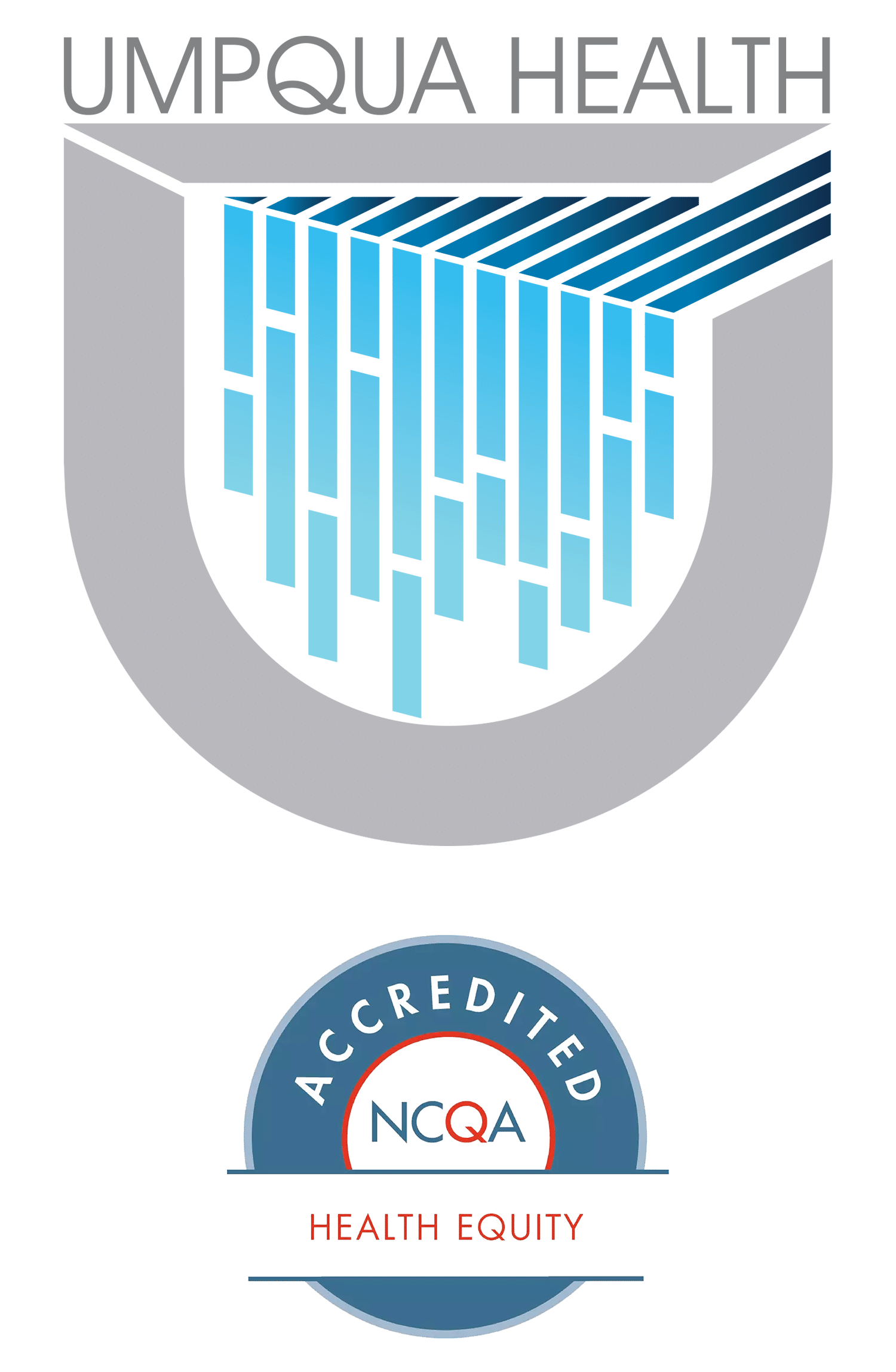Provider Newsletter November 2019
 Practice Tactics
Practice Tactics
CCOs are categorized into several types, depending on the services provided by the CCO:
- CCO-A: Physical Health, Mental Health, NEMT, and Dental services
- CCO-B: Physical Health, Mental Health, and NEMT services
- CCO-E: Mental Health and NEMT services
- CCO-F: Dental and NEMT services
- CCO-G: Mental Health, Dental, and NEMT services
Populations covered within the CCO program are categorized into the following major categories of aid:
- Temporary Assistance to Needy Families (TANF)
- Poverty Level Medical (PLM) Adults
- PLM, TANF, and Children’s Health Insurance Program (CHIP) Children
- Blind, Disabled, and General Assistance Client (AB/AD) and Old Age Assistance (OAA)
- Children in Adoptive, Substitute, or Foster Care (CAF)
- Affordable Care Act (ACA) Adults
- Breast Cancer and Cervical Cancer Program (BCCP)
- Third Party Liability (TPL) Populations
Currently, Umpqua Health Alliance is only a type A and B CCO, but starting in 2020, UHA will be an all-class CCO, covering types A through G. The implication for practices is that some UHA members will not be covered for the services they provide. For example, for a PCP or specialist, a member with only E, F or G coverage will not be reimbursed by UHA for their services.
Fortunately, greater than 95% of UHA members have coverage under type A and B, but it is still important for practices to check CIM for the type of CCO enrollment a new patient has to ensure proper reimbursement.
UHA Clinical Engagement Team Expanding
Umpqua Health Alliance is excited to welcome Rob McAdam to the team. Rob recently joined UHA as the Behavioral Health Director. Rob will provide leadership to UHA’s Behavioral Health programs, specifically focusing on the utilization management, case management, and network support. Rob comes from Mid-Valley Behavioral Care Network in Salem, where he was the Quality and Network Director. McAdam has also served in clinical roles with other organizations throughout his career. Rob holds a LCSW, and has quickly become an integral part of UHA’s Clinical Engagement team. Click here to contact Rob.
 Clinical Corner
Clinical Corner
Reminders from Choosing Wisely campaign in time for the URI/Influenza Season
Don’t order sinus computed tomography (CT) or indiscriminately prescribe antibiotics for uncomplicated acute rhinosinusitis.
Viral infections cause the majority of acute rhinosinusitis and only 0.5 percent to 2 percent progress to bacterial infections. Most acute rhinosinusitis resolves without treatment in two weeks. Uncomplicated acute rhinosinusitis is generally diagnosed clinically and does not require a sinus CT scan or other imaging. Antibiotics are not recommended for patients with uncomplicated acute rhinosinusitis who have mild illness and assurance of follow-up. If a decision is made to treat, amoxicillin should be first-line antibiotic treatment for most acute rhinosinusitis.
Don’t routinely avoid influenza vaccination in egg-allergic patients.
Of the vaccines that may contain egg protein (measles, mumps, rabies, influenza and yellow fever), measles, mumps and rabies vaccines have at most negligible egg protein; consequently, no special precautions need to be followed in egg-allergic patients for these vaccines. Studies in egg-allergic patients receiving egg-based inactivated influenza vaccine have not reported reactions; consequently, egg-allergic patients should be given either egg-free influenza vaccine or should receive egg-based influenza vaccine with a 30-minute post-vaccine observation period.
–American Academy of Allergy, Asthma & Immunology
Don’t routinely prescribe antibiotics for acute mild-to-moderate sinusitis unless symptoms last for seven or more days, or symptoms worsen after initial clinical improvement.
Symptoms must include discolored nasal secretions and facial or dental tenderness when touched. Most sinusitis in the ambulatory setting is due to a viral infection that will resolve on its own. Despite consistent recommendations to the contrary, antibiotics are prescribed in more than 80 percent of outpatient visits for acute sinusitis. Sinusitis accounts for 16 million office visits and $5.8 billion in annual health care costs.
 Don’t prescribe antibiotics for otitis media in children aged 2–12 years with non-severe symptoms where the observation option is reasonable.
Don’t prescribe antibiotics for otitis media in children aged 2–12 years with non-severe symptoms where the observation option is reasonable.
The “observation option” refers to deferring antibacterial treatment of selected children for 48 to 72 hours and limiting management to symptomatic relief. The decision to observe or treat is based on the child’s age, diagnostic certainty and illness severity. To observe a child without initial antibacterial therapy, it is important that the parent or caregiver has a ready means of communicating with the clinician. There also must be a system in place that permits reevaluation of the child.
–American Academy of Family Physicians
Don’t order antibiotics for adenoviral conjunctivitis (pink eye).
Adenoviral conjunctivitis and bacterial conjunctivitis are different forms of infection that can be diagnosed by the ophthalmologist by clinical signs and symptoms, and if needed, by cultures. Antibiotics are useful for patients with bacterial conjunctivitis, particularly those with moderate to severe bacterial conjunctivitis. However, they are not useful for adenoviral conjunctivitis, and the overuse of antibiotics can lead to the emergence of bacteria that don’t respond readily to available treatments. In cases of diagnostic uncertainty, patients may be followed closely to see if their condition resolves on its own, or if further treatment is required.
–American Academy of Ophthalmology
Antibiotics should not be used for apparent viral respiratory illnesses (sinusitis, pharyngitis, bronchitis and bronchiolitis).
Although overall antibiotic prescription rates for children have fallen, they still remain alarmingly high. Unnecessary medication use for viral respiratory illnesses can lead to antibiotic resistance and contributes to higher health care costs and the risks of adverse events.

Cough and cold medicines should not be prescribed or recommended for respiratory illnesses in children under four years of age.
Research has shown these products offer little benefit to young children and can have potentially serious side effects. Many cough and cold products for children have more than one ingredient, increasing the chance of accidental overdose if combined with another product.
–American Academy of Pediatrics
Avoid prescribing antibiotics for upper respiratory infections.
The majority of acute upper respiratory infections (URIs) are viral in etiology and the use of antibiotic treatment is ineffective, inappropriate and potentially harmful. However, proven infection by Group A Streptococcal disease (Strep throat) and pertussis (whooping cough) should be treated with antibiotic therapy. Symptomatic treatment for URIs should be directed to maximize relief of the most prominent symptom(s). It is important that health care providers have a dialogue with their patients and provide education about the consequences of misusing antibiotics in viral infections, which may lead to increased costs, antimicrobial resistance and adverse effects.
—Infectious Disease Society of America
 On the Lookout
On the Lookout
November is Diabetes Awareness Month
November 14th is World Diabetes Day. It is time to raise awareness about both Type 1 and Type 2 Diabetes.
In Oregon, the burden of diabetes has increased. Among adults the prevalence of diabetes has more than doubled—an increase of 124%–over the past 20 years. Approximately 287,000 adults have been diagnosed with diabetes, and 110,000 adults with diabetes do not know it. About 1.1 million adults have prediabetes, which puts them at high risk for developing type 2 diabetes. African-Americans are three times as likely and American Indian and Alaskan Natives are twice as likely to have diabetes compared to non-Latino whites. The estimated total cost of diabetes in Oregon is nearly $3 billion per year.
The Oregon Health Authority provides links to resources for people with diabetes, providers, and payers. Please see: https://www.oregon.gov/oha/PH/DISEASESCONDITIONS/CHRONICDISEASE/DIABETES/Pages/resources.aspx#providers
Douglas County has diabetes resources in the community including the Diabetes Support Group: 2459 Stewart Parkway, Roseburg, (541-672-1705); Diabetes Prevention Program at Cow Creek Health and Wellness: 2371 NE Stephens St., Roseburg, (541-677-5575); and Living Well with Chronic Conditions at Umpqua Community Health Center (AVIVA), 150 NE Kenneth Ford Dr., Roseburg, (541-672-9596).
 Update: CDC Reports Lung Injury Associated with Use of E-Cigarette or Vaping Products
Update: CDC Reports Lung Injury Associated with Use of E-Cigarette or Vaping Products
Recent CDC laboratory testing of bronchoalveolar lavage (BAL) fluid samples (or samples of fluid collected from the lungs) from 29 patients with EVALI submitted to CDC from 10 states found vitamin E acetate in all the BAL fluid samples. Vitamin E acetate is used as an additive in the production of e-cigarette, or vaping, products. This is the first time that we have detected a potential chemical of concern in biologic samples from patients with these lung injuries.
CDC continues to recommend that people should not use e-cigarette, or vaping, products that contain THC, particularly from informal sources like friends, or family, or in-person or online dealers. We will continue to provide updates as more data become available.
The CDC update report is available here.
Information for Healthcare Providers can be found here.
Oregon vaping illness investigations are ongoing. As of November 5, 2019, there have been 17 cases reported, of which two resulted in death. OHA confirms that there are cases involving individuals under the age of 18.
Douglas County youth and young adults between the ages of 13 and 24 wanting to quick vaping now have access to This Is Quitting, a FREE text-based vaping cessation program from the Truth Initiative, DPHN, CHI Mercy, and the Blue Zones Project. To enroll, interested persons need only text “VAPEFREEDC” to 88709. (Parents of vapers interested in resources can text QUIT to 202-899-7550.)
Oregon’s Acute and Communicable Disease office information on vaping illness and reporting requirements for clinicians are found here.
 CME for Thee
CME for Thee
Advanced Directive Training: PLEASE NOTE: THIS HAS BEEN CANCELED
Having an Advance Directive in place helps loved ones and medical personnel make important decisions during a crisis. This important document ensures that a patient’s wishes regarding health care are carried out, even when they are unable to make their wishes known.
Umpqua Health is working to promote the use of the Advance Directive in our community by providing a FREE “Train the Trainer” day on Monday, DECEMBER 9, 2019.
Oregon Health Decisions will be presenting the trainings in the conference room of the Newton Creek Clinic, and we hope to have representatives from each provider office attend. Having trained staff embedded in provider offices accomplishes two things; they will be in a position to encourage and assist their patients to complete the directive, and will also be able to train other staff members to do the same. Making this a community wide effort can have a huge impact on our population in terms of making their values and choices readily available to medical personnel in a crisis.
Training times will be announced at a later date, but initially we would like to get an idea of the number of attendees. Please email our Provider Network Representative Karen Wright at KWright@umpquahealth.com, or call her directly at (541) 229-7707 by December 9, with the number of staff members who will be available to attend, and if you have a preference for a morning, noon or afternoon training time. The training takes approximately 90 minutes, and each attendee will be provided with the written materials they need to get started. Again, this training is provided at no cost.

Umpqua Health Alliance Public Presentation and Community Engagement Meeting
You’re invited to attend the Umpqua Health Alliance Public Presentation and Community Engagement Meeting.
What:
Umpqua Health Alliance will host a free community presentation in Douglas County. This forum will provide the opportunity to ask questions and learn more about how Umpqua Health Alliance will operate in the community. The forum will include:
- UHA Introduction and History
- Community Engagement
- CCO 2.0 Focus Areas
- Information Technology
- Behavioral Health
- Community Input and Feedback
Who: Everyone
How: Sign up here
When: November 13th, from 4 to 5 PM (Light refreshments will be provided)
Where: The Cow Creek Band of the Umpqua Tribe of Indians – Board Room
2371 NE Stephens Street
Roseburg, OR 97470
November 14th Medications for Addiction (MAT)- DATA-Waiver Training
Who: Prescribing Clinicians and others interested medications for addiction treatment (MAT)
How: Sign up here
When: November 14th, 2019 from 12:30 to 4:45 PM (Lunch will be provided)
Where: Jackson County Health and Human Services Building, 140 S. Holly St. Medford OR
Contacts: Laura Heesacker, Heesackerl@Careoregon.org or Stacie Andoniadis AndoniadisS@Careoregon.org



